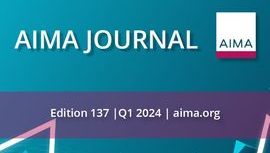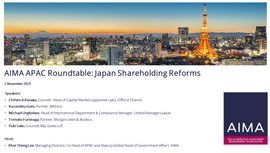AIMA advocacy in action
Published: 06 September 2022
Hopefully August offered members a chance to take a break, recharge and get ready for the busy autumn period. Unfortunately, when it comes to regulatory work summer typically doesn’t offer much respite and here at AIMA there has been a huge amount of activity on this front over the summer months, reflecting the enormous scale of rulemaking in both the US and Europe.
The nature of the policy process means that advocacy wins can take time to materialise, in part due to the range of stakeholders involved in the rulemaking process. But sometimes issues crop up that require urgent attention and swift regulatory intervention to ensure that firms’ operations are not significantly impacted.
One such issue arose earlier this year in the UK. In the course of implementing its new prudential rules (the Investment Firms Prudential Regime or IFPR), the FCA tweaked a definition in its handbook but didn’t appreciate that in so doing it had inadvertently widened the scope of its ‘enhanced firm’ rules under the Senior Managers and Certification Regime (SMCR), meaning that from next year many of our UK-based members would have been burdened with onerous rules on mapping of internal functions and preparation of handover documents. These requirements might make sense for vast international banking groups, but are simply not proportionate for an asset management firm with a few dozen staff.
We approached the FCA to explain our concerns, initially with little success. We were convinced that our arguments were sound and so we continued to push the matter, sharing detailed data with the regulator to illustrate how their rules would work in practice and providing a sense of the sort of firms that would be directly impacted.
Our perseverance paid off and we were rewarded in August with a statement from the FCA committing to consult on changes to fix the problem whilst clarifying that “that firms that have unintentionally come under the Enhanced Scope SM&CR Regime […] need take no action”.
This was a great outcome for AIMA and a solid illustration of the importance of our dialogue with regulatory authorities in the UK and globally. It was also a testament to the invaluable input that we receive from members including law firms (particular thanks to Simmons & Simmons for supporting us on this issue) and from asset managers. It was this input that allowed us to make the strongest possible case to the FCA and ultimately sway their thinking for the ultimate benefit for the UK industry as a whole.









